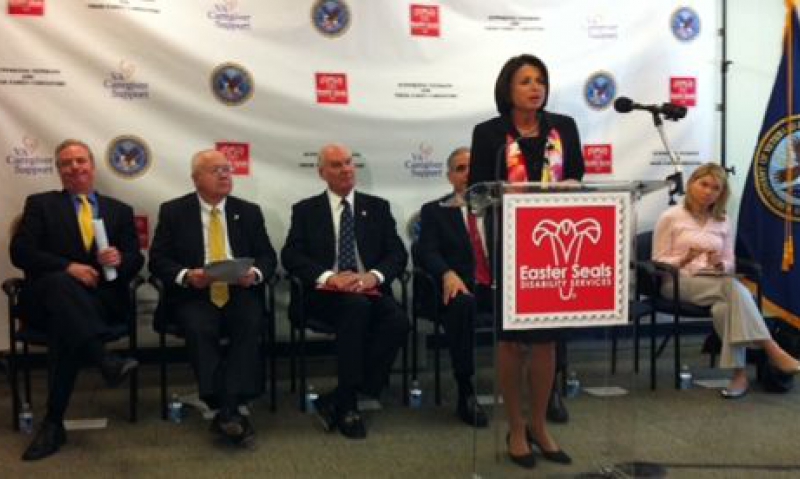
Plan for caregiver training in place
On May 9, 2011, the Department of Veterans Affairs announced that they are accepting new applications for Caregiver benefits. Additionally, during a press conference held on the same day, VA partnered with Easter Seals which will be developing training for VA’s Caregiver Program.
James E. Williams Jr. president and chief executive officer of Easter Seals, provided opening remarks at the press conference. He highlighted Easter Seals commitment to supporting adults living with disabilities for more than 90 years. Williams added that, “We are proud to announce our new role for VA to provide comprehensive training and support for family caregivers.”
Rep. Chris Van Hollen, D-Md., commended VA and Easter Seals’ vision in partnering to develop caregiver training. Van Hollen said, “We owe it to the men and women in the military to provide them with the best care when they return home, and that commitment includes the best care for their family.” Van Hollen also praised his fellow colleagues in the House and Senate, as well as VA and veterans service organizations such as The American Legion for their support of the Caregivers and Omnibus Health Services Act of 2010.
Following passage of the law on May 5, 2010, VA developed a Caregiver Implementation Committee and submitted their plan in February 2011 to the Office of Management and Budget. The American Legion urged VA to speed up implementation of the Caregiver plan to ensure eligible caregivers receive the benefits and support they needed. Shortly thereafter, VA worked quickly in publishing an interim final rule to speed up implementation of Caregiver Program.
“VA recognizes veteran caregivers are our partners and their education and training is critical to their success,” said Debbie Ambur, chief consultant and lead VA senior staff on implementation of the Caregiver program. “Caregiver training is vital not only for veterans’ care, but for the individual caregiver.
Sarah Wade, a caregiver and advocate for the caregiver legislation, thanked Easter Seals and VA for the increased support but encouraged both agencies to continue working with veterans service organizations and individual caregivers to refine and continuously improve training in the future. VA’s under secretary for Health, Dr. Robert Petzel, highlighted the partnership between Easter Seals and VA to ensure proper and comprehensive training be provided to caregivers in the home. Petzel underscored the importance of caregivers applying today for caregiver benefits, including the stipend, insurance and training. He added that the “stipend will be retroactive back to the date the application was received.”
The legislation expanded services for primary, family and general veteran caregivers. For primary caregivers of veterans who served after Sept. 11, 2001, VA will provide a stipend, mental health services, respite care and health-care coverage. For family caregivers of veterans who served after Sept. 11, 2001, VA will provide instruction, training, travel and lodging, per diem for training, respite care and counseling. General caregivers for veterans of all eras are provided in-person education, counseling, respite care and information on all VA benefits and services. The legislation also requires VA to conduct a two-year feasibility and implementation study for expansion of benefits to caregivers of all eras.
Caregivers can apply by completing one of the following:
• Complete VA’s four pre-screening questions on VA’s Health Eligibility Center website. Those questions include 1) Is the person needing caregiver assistance currently in the military? 2) Is the person enrolled in VA health care benefits? 3) Is the person currently enrolled in VA health-care benefits? 4) Does the veteran or servicemember require at least six months of continuous supervision or assistance with performing basic functions of everyday life due to serious injury or mental disorder (including psychological trauma or other mental disorder) incurred or aggravated in the line of duty on or after Sept. 11, 2001?
• If the caregiver is eligible after completing the pre-screening questions, they are directed to VA Form 10-10CG, Application for Comprehensive Assistance for Family Caregiver Program. The application can be found here. After completing the application, it must be signed by the veteran and caregiver and should be mailed to Family Caregiver Program, Health Eligibility Center, 2957 Clairmont Road NE, Ste 200, Atlanta, GA 30329-164.
• Applications can be made by calling (877) 222-8387. Caregivers can also call VA’s National Caregiver Support Line (855-230-3274) for questions on caregiver programs and services.
• Visit the VA medical center closest to your home. Each VA medical center has a Caregiver Support Manager that can provide assistance with enrollment and support services.
